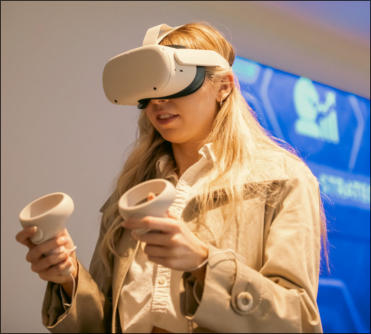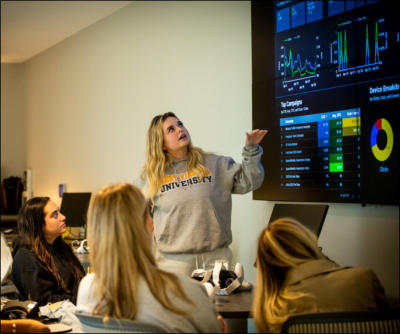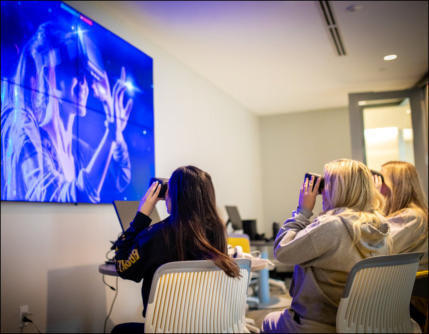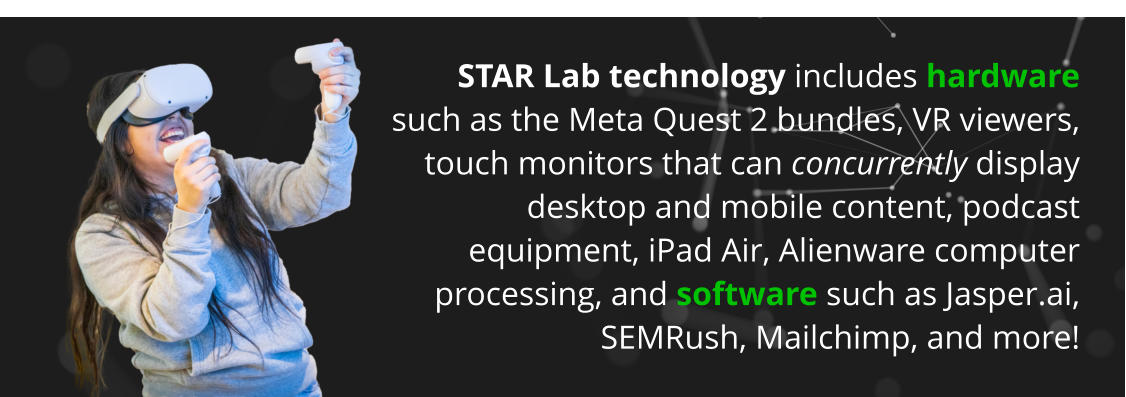Laurel-Cook.com




Designed and built by Laurel Aynne Cook
© Laurel Aynne Cook 2024

Social Technology and Research (S.T.A.R.) Lab
A
critical
component
of
a
world-class
business
education
is
the
infusion
of
project-based,
experiential
learning
designed
to
help
students
develop
crucial
skills
to
succeed
in
business
today.
When
students
are
given
opportunities
to
apply
lessons
to
real-world
situations,
they
graduate
as
capable
professionals
who
understand
how
to
immediately
create
impact
in
their
organizations.
In
response,
the
Social
Technology
and
Research
(S.T.A.R.)
Lab
has
been
created
as
an
immersive
playground
where
the
latest
technology
in
social
media
and
marketing
is
used
by
faculty,
students,
and
the
business
community
to
develop
innovative
solutions
for
the
real-world
challenges
of
local
and
national
partners.
MarTech
gets
marketers
closer
to
the
consumer but has been missing in higher education. Until
now
.
In
this
space
at
the
Chambers
College
of
Business,
students,
faculty,
and
the
WVU
community
can
utilize
current
and
emerging
technologies
for
public
outreach,
R1-level
research,
product
development,
and
superior
student
engagement.
The
Lab
showcases
marketing
expertise
in
analytics,
social
media,
search
engine
marketing
(advertising
and
SEO),
inbound
marketing,
mobile,
and
design.
Importantly,
the
Lab’s
co-created
social
content
is
on
full
display
through
the
sizeable
livestream feed that greets all students, staff, and visitors who enter Reynolds Hall from WVU’s iconic PRT system.
How will this lab benefit students in NEW ways?
The
STAR
Lab
offers
students
the
ability
to
become
involved
in
their
learning
intellectually,
emotionally,
and-
equally
as
important,
physically.
In
response,
the
Lab
offers
students
a
learn-by-doing
approach
with
the
important
distinction
of
providing
access
to
current
and
emerging
marketing
technologies.
They
will
have
access
to
learn
and
use
technologies
that
were
previously
unavailable.
Indeed,
the
Chambers
College
marketing
curriculum
and
course
offerings
have
been
updated
to
reflect
many
of
these
important
changes
(e.g.,
MKTG-
389:
Online
Marketing
Analytics;
MKTG-435:
AI
Impact
on
Marketing).
Students
involved
with
this
Lab
will
be
able
to
graduate
with
the
experiences,
certifications,
and
knowledge
that
peers
at
most
other
institutions
lack.
Their
powered-up
resumes
coupled
with
their
in-depth
MarTech
experiences
will
give students the confidence they need to get the top jobs they deserve.
What is the VISION for the STAR Lab?
The
vision
for
the
STAR
Lab
includes
collaboration
between
the
stakeholders
you
may
expect,
namely
students,
faculty,
our
local
business
community,
and
corporate
partners.
However,
we
also
anticipate
working
with
tech
providers,
developers,
policy
makers,
and
social
marketers
(e.g.,
Transformative
Consumer
Research
,
Twitter
for
Good).
This
union
between
technology
and
purpose
will
create
a
space
that’s
exciting
yet
challenging.
This
Lab
space
should
provoke
everyone
involved
to
push
boundaries
that
place
us
firmly
outside
of
our
comfort
zones.
It
should
include
courses,
events,
competitions,
and
a
variety
of
other
programming
(e.g.,
workshops).
With
a
prominent
location
in
Reynold’s
Hall,
passers-by
will
stop
to
gaze
through
the Lab’s glass wall and feel drawn to content and activity inside.
What makes the STAR Lab UNIQUE when compared to other universities?
Overall,
the
people
(e.g.,
the
inventor
of
AI-Writer
,
a
content
generation
platform
powered
by
artificial
intelligence),
the
projects
(e.g.,
substantive
marketing
questions,
including
online
safety
&
privacy
),
and
the
technology
(e.g.,
CRM
software,
SMM
tools)
make
the
STAR
Lab
unique
in
comparison
to
lab
spaces
at
peer/aspirant
colleges
and
universities.
While
there
are
a
few
tech-related
lab
spaces
at
other
institutions,
there
are
even
fewer
that
are
included
in
business
schools.
Of
those
lab
spaces
at
other
schools
that
include
technology,
few
(if
any)
are
dedicated
exclusively
to
MarTech.
The
STAR
Lab
includes
a
marketing
science
orientation,
unlike
other
tech-related
labs
managed
or
led
by
computer
science
(CS)
or
information
science
(IS)
faculty.
Additionally,
the
Lab’s
co-created
social
content
is
promoted
through
a
sizeable
livestream
that
is
visible
at
all
times.
While
such
live
feeds
are
already
used
by
marketing
practitioners
(e.g.,
Southwest
Airlines’
Social
Media
Listening
Center),
its
inclusion
in
the
STAR Lab will showcase WVU as a leader in higher education.
What is MarTech CRUCIAL in today’s business environment?
MarTech
is
crucial
in
today’s
business
environment
because
it
gets
marketers
closer
to
the
consumer.
Such
technology
offers
improved
CX
(customer
experience)
through
online
and
offline
(e.g.,
retail)
channels.
For
example,
consumers
gain
a
personalized
shopping
experience
(e.g.,
location-based
services),
marketers
gain
targeted
insight
(e.g.,
in-market
audiences),
and
businesses
create
better
and
more
sustainable relationships (e.g., semantic understanding capabilities).
What is the lab’s LIVESTREAMED content?
The
information
livestreamed
in
the
STAR
Lab
includes
text
and
media-based
content.
Examples
may
include
social
media
marketing
content
(Instagram
posts),
search
ads
(Google
Ads),
display
ads
(YouTube
videos),
ad
copy
(including
AI-powered
text/imagery),
and
analytics
(Data
Studio
output,
SEO/PPC/CRO
metrics).
The
collection
of
monitors
located
on
the
Lab’s
primary wall may include each of these examples separately or as a single (larger) livestream.
Is the STAR Lab used mostly for SOCIAL MEDIA?
This
Lab
is
not
a
social
media
lab.
Instead,
it
is
a
space
for
the
larger
context of social technology. Lab users learn about the following:
•
Content
Creation
(written,
visual,
and
audio;
e.g.,
AI-Writer,
YouTube, TikTok, Murf.ai)
•
G-suite
Software
Tools
(e.g.,
Google
Ads,
AI,
Analytics,
Data
Studio,
Google My Business)
•
Search
Engine
Marketing
(SERPs,
snippets,
local
SEO,
pay-per-
click advertising)
•
Social
Media
Marketing
(i.e.,
using
Hootsuite,
Analytics
for
Twitter, TikTok, Instagram, LinkedIn, and YouTube)
•
E-commerce
(e.g., Spotify, WIX)
•
Email Marketing
(e.g., MailChimp)
•
Influencer Marketing
(e.g., Famebit) and much more!






















A
critical
component
of
a
world-class
business
education
is
the
infusion
of
project-based,
experiential
learning
designed
to
help
students
develop
crucial
skills
to
succeed
in
business
today.
When
students
are
given
opportunities
to
apply
lessons
to
real-world
situations,
they
graduate
as
capable
professionals
who
understand
how
to
immediately
create
impact in their organizations.
In
response,
the
Social
Technology
and
Research
(S.T.A.R.)
Lab
has
been
created
as
an
immersive
playground
where
the
latest
technology
in
social
media
and
marketing
is
used
by
faculty,
students,
and
the
business
community
to
develop
innovative
solutions
for
the
real-world
challenges
of
local
and
national
partners.
MarTech
gets
marketers
closer
to
the
consumer
but
has
been
missing
in
higher
education. Until
now
.
In
this
space
at
the
Chambers
College
of
Business,
students
and
faculty
can
utilize
current
and
emerging
technologies
for
public
outreach,
R1-level
research,
product
development,
and
superior
student
engagement.
The
Lab
showcases
marketing
expertise
in
analytics,
social
media,
search
engine
marketing
(advertising
and
SEO),
inbound
marketing,
mobile,
and
design.
Importantly,
the
Lab’s
co-created
social
content
is
on
full
display
through
the
sizeable
livestream
feed
that
greets
all
students,
staff,
and
visitors
who
enter
Reynolds
Hall
from
WVU’s
iconic
Personal Rapid Transit system.








The
STAR
Lab
is
a
space
for
the
larger
context
of
social
technology.
Lab
users
learn about the following:
•
Content
Creation
(written,
visual,
and
audio;
e.g.,
AI-Writer,
YouTube,
TikTok,
Murf.ai)
•
G-suite
Software
Tools
(e.g.,
Google
Ads,
AI,
Analytics,
Data
Studio,
Google
My Business)
•
Search
Engine
Marketing
(SERPs,
snippets,
local
SEO,
pay-per-click
advertising)
•
Social
Media
Marketing
(i.e.,
using
Hootsuite,
Analytics
for
Twitter,
TikTok,
Instagram, LinkedIn, and YouTube)
•
E-commerce
(e.g., Spotify, WIX)
•
Email Marketing
(e.g., MailChimp)
•
Influencer
Marketing
(e.g.,
Famebit)
and much more!












